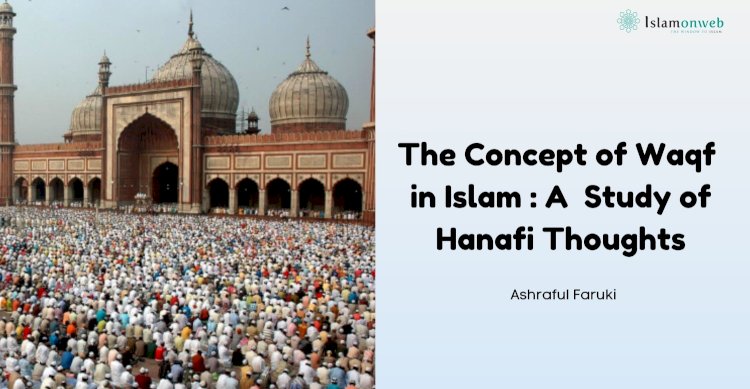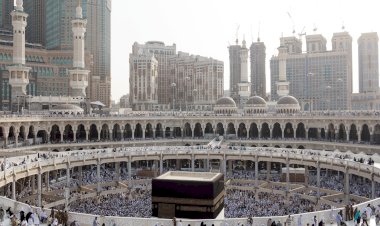The Concept of Waqf in Islam: A Textual Study of Hanafi Jurisprudential Thoughts
Since the Minister of Minority Affairs, Kiren Rijiju, introduced the Waqf Amendment Bill 2024 in Parliament—aiming to amend the Waqf Board for the welfare and development of minorities—the topic of the Waqf Amendment has ignited widespread debate across the country. The bill has drawn considerable criticism, with many accusing the Modi government of attempting to seize Waqf properties and place them under central government control. There are also concerns that the bill could allow non-Muslims and women to be included in Waqf board membership.
India has 32 Waqf boards, each state and union territory having its own board responsible for managing, regulating, and protecting Waqf properties. According to sources such as The Economic Times, these boards collectively control around 8.7 lakh properties nationwide, spanning approximately 9.4 lakh acres with an estimated value of Rs 1.2 lakh crore. In fact, a report by The Print identifies the Waqf boards as the country’s third-largest landowners, following the Indian Railways and the armed forces. Over 8.72 lakh immovable Waqf properties are registered in the Waqf Management System of India (WAMSI).
The proposed amendment would make it mandatory for all Waqf properties to be registered under the district collector. Currently, the country’s 32 Waqf boards operate independently across various states, but the amendment suggests forming a national Waqf board to oversee them.
This article explores the concept of Waqf, its significance in Islam, and its historical and religious relevance, along with its purpose. Additionally, we will examine the importance of Waqf in contemporary society.
What is Waqf
In Arabic, the act of donating one’s movable or immovable property for public welfare and charitable purposes is termed as waqf. The individual who establishes a Waqf is called the Waqif (donor), while the property or asset, whether movable or immovable, dedicated as Waqf is termed Maukuf. The beneficiaries of this Waqf are known as Maukuf Alayh. For example, if someone dedicates a mosque to the welfare of the Muslims in their village, the Muslim community becomes the Maukuf Alayh.
The Arabic word waqf linguistically means to restrain, limit, or stop, as in “I have restrained this animal or this thing.” In its linguistic sense, Waqf implies restricting ownership of something. Once a property or asset is designated as Waqf, it cannot be claimed by any individual and is permanently dedicated to public welfare and charitable purposes.
Concept of Waqf in Hanafi School
In Islamic jurisprudence, particularly within the Hanafi School, Imam Abu Hanifa defines Waqf as the act of keeping an asset under the ownership of the donor while restricting its ownership for personal and external use, dedicating its benefits solely to charitable causes. The rewards (ajar and sawab) for Waqf (endowment) property are continuously credited to the donor as a form of ongoing charity. Therefore, once an asset is declared as Waqf, it cannot be sold, transferred, bequeathed, or gifted; its ownership is retained exclusively for charitable purposes.
In his notable work on Sunni Islamic jurisprudence in Urdu, Bahare Shariat, Indian Hanafi jurist Maulana Mufti Muhammad Amjad Ali Azami defines Waqf as the act of taking property out of an individual’s ownership and dedicating it to Allah, such that its benefits and profits are received as sadaqah by intended recipients among Allah’s servants. He also notes that once a Waqf is established and properly managed, it cannot be dissolved or become hereditary. The Waqf property cannot be sold, bought, or given as a gift, and the ownership remains neither with the donor nor with the beneficiaries.
Throughout history, Caliphs, Muslim rulers, affluent individuals, and influential Muslims have donated wealth for public welfare and developmental purposes under the concept of Waqf. Mosques, madrasas, guest houses, and other public facilities have often been established under Waqf laws, benefiting communities and promoting social welfare.
Ownership of Waqf Property According to Imam Abu Hanifa
In the Hanafi school, the prominent scholar and jurist Allama Burhanuddin Abu al-Hasan Ali al-Marghinani (may Allah have mercy on him) mentions in Al-Hidaya that “Abu Hanifa (may Allah have mercy on him) said: The ownership of the Waqf property does not leave the donor until it is approved by the ruler or administrator, or the donor links it to his death by stating explicitly during his lifetime, ‘If I die, then I dedicate this as Waqf.’”
According to Imam Abu Hanifa, for a Waqf to be considered valid, it requires either formal approval by an administrator or a conditional statement that connects the Waqf to the donor’s death. Without one of these conditions, the ownership remains with the donor.
Abu Yusuf, a close disciple of Abu Hanifa, held a different view, asserting that a simple declaration by the donor, such as “I have dedicated this property as Waqf,” is sufficient to transfer ownership and validate the Waqf, without requiring further conditions.
Imam Muhammad al-Shaibani presents another perspective, differing from both views above. He contends that the donor’s ownership does not end until a Mutawalli (caretaker) is appointed and the property is officially handed over to this caretaker for management and oversight.
Views of Imam Abu Yusuf and Imam Muhammad al-Shaibani
In Al-Hidaya, jurist Allama Burhanuddin Abu al-Hasan Ali al-Farghinani elaborates on the views of Imam Abu Yusuf and Imam Muhammad al-Shaibani regarding Waqf property. According to both scholars, the ownership of Waqf property transfers to Allah once it is dedicated, making it unsellable and non-transferable under any circumstances. Any profits generated from the Waqf property must be directed solely toward the intended charitable beneficiaries.
Imam Abu Yusuf and Imam Muhammad al-Shaibani emphasize that, once a property is declared as Waqf, it cannot be sold, gifted, or bequeathed. They support their view by referencing a hadith in which the Prophet ﷺ advised Umar (may Allah be pleased with him) regarding the donation of his land, Thamgh, as charity. The Prophet said, “Give it in charity (as an endowment) with its origin (land and trees) on the condition that it will neither be sold, legally inherited, nor given as a gift.” (This hadith is reported by both Imam Bukhari and Imam Muslim.)
This hadith serves as foundational evidence for Abu Yusuf and Muhammad al-Shaibani’s stance that Waqf property is permanently dedicated to Allah and restricted to its charitable purpose, with no allowance for transfer or personal ownership once it is designated as Waqf.
Outline of Two Distinct Views on Waqf Ownership in Hanafi Jurisprudence
In Islam, the concept of waqf represents an act of endowment or donation by which a Muslim dedicates their property for the welfare and charitable benefit of a public group or society. This legal process involves the donor (waqīf) setting aside assets or properties (Mawqūf) for specific charitable or welfare purposes. Upon establishing a waqf, the ownership of the property is relinquished by the donor. However, Islamic jurists hold differing opinions on the nature of this ownership once the endowment is completed. In the Hanafi school, there are two distinct views:
- No Ownership: According to one view, the waqf property (mawquf) remains without any specific ownership. It is detached from individual possession and exists solely for its designated charitable purpose.
- Ownership Returns to Allah: Another perspective is that the ownership of the waqf property reverts to Allah, who initially granted the property to the donor by His grace. In this view, Allah is considered the ultimate owner, while the property remains exclusively devoted to its charitable intent.
In both interpretations, the donor forfeits all personal rights over the waqf property once it is established. Generally, the assets or properties are managed by a custodian (mutawallī) who oversees their use and ensures they serve the intended purpose.
Waqf of Movable Properties
In Al-Hidayah, jurist Allama Burhanuddin Al-Marghinani explains that there is unanimous agreement among jurists on the validity of Waqf for immovable properties. However, opinions differ regarding the permissibility of Waqf for movable properties. Some scholars view Waqf for movable assets as permissible, while others disagree.
Imam Abu Hanifa maintains that Waqf of movable property is invalid. In contrast, his prominent students, Imam Abu Yusuf and Imam Muhammad (may Allah have mercy on them), permit Waqf of movable properties under specific conditions.
According to Imam Abu Yusuf, if a person dedicates their farmland as Waqf, including the associated farming tools and equipment, then the endowment is valid. However, if only the tools are dedicated without the land, the Waqf is not valid. Imam Muhammad shares a similar perspective but goes further, permitting the Waqf of solely movable items, such as a horse or sword, if dedicated for the sake of Allah.
These differing views reflect a nuanced approach within Hanafi jurisprudence, where the validity of Waqf for movable properties depends on the context and purpose of the dedication.
Waqf in Contemporary Society
Throughout Islamic history, waqf endowments have played a significant role in shaping Islamic societies, influencing economies, and guiding public policy. Up until the modern era, waqf was one of the primary means of providing the general public with access to healthcare, education, and other essential services. Additionally, private endowments could offer asset protection for the donor or their family if named as beneficiaries.
The waqf system’s principle of inviolability has historically safeguarded assets within Islamic society, as waqf properties cannot be sold to settle debts, seized by a government adhering to Islamic law, or used for purposes other than those initially designated.
In many Islamic countries today, a dedicated Ministry of Awqaf and Religious Affairs oversees, regulates, and maintains these endowments (mawquf). Examples include such ministries in Qatar, Saudi Arabia, and Egypt. However, due to evolving modern demands and challenges, the trend of establishing properties as waqf has seen a decline in contemporary times.
About the Author: Ashraful Faruki, PG Research Scholar, Department of Civilizational Studies, Darul Huda Islamic University, Kerala. He also doing his external degree in the BA Honours programme in Sociology at Indira Gandhi National Open University (IGNOU). His writings include Islamic Civilization, Islamic emerging issues, Contemporary Islamic Thoughts, Indian Muslims, Socio-political issues in India, in English, Urdu and Assamese Languages.
REFERENCES
- Heena Fatima. “India’s 3rd-largest landlords, waqf boards are beset with litigations, demolitions, bias.” The Print. June 24, 2024.
- Editorial online “Waqf Through the Ages: How Rs 1-lakh Crore Property Owner Board Acquires Land and What the Govt Aims to Change.” The Economic Times, August 8, 2024.
- Sobhana K Nair. “Joint parliamentary panel on Waqf bill gets 8 lakh petitions from public, institutions.” The Hindu. September 6, 2024.
- Burhanuddin Al Marghinani, Al-Hidayah (The Guidance) Arabic, Volum 4, Madinah Munawwarah, Dar al-siraaj, 2019, 367-385
- Moulana Mufti Muhammad Amjad Ali Azami, Bahaare Shariat, Volum 2, part b, Maktabatul Madina, June 20, 2014. 521-548.
- Adam Zeidan, (2024, October 3). Waqf: Meaning, Importance, & Islam. Encyclopedia Britannica, October 3, 2024. https://www.britannica.com/topic/waqf
- Sahih al-Bukhari 2764 - Wills and Testaments (Wasaayaa) - كتاب الوصايا- Sunnah.com - Sayings and Teachings of Prophet Muhammad (صلى الله عليه و سلم), https://sunnah.com/bukhari:2764.
Disclaimer
The views expressed in this article are the author’s own and do not necessarily mirror Islamonweb’s editorial stance.
























Leave A Comment